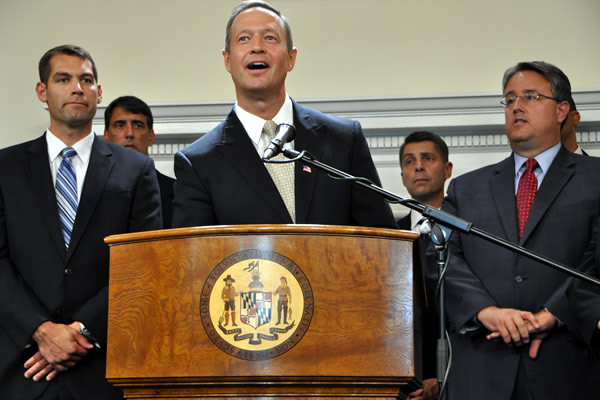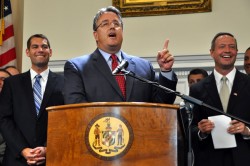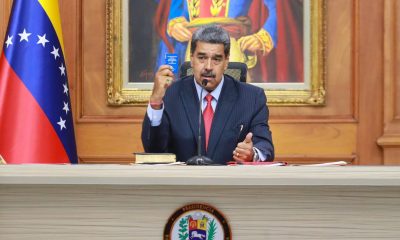Local
O’Malley backs 2012 push for marriage equality
Bill becomes part of guv’s legislative package
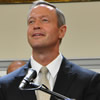
ANNAPOLIS, Md. — Flanked by lawmakers and members of a broad coalition of Maryland LGBT leaders, Gov. Martin O’Malley today announced that a law legalizing same-sex marriage would be part of his 2012 legislative package.
After a disappointing 2011 session for marriage equality advocates in Maryland, ending with the death of a Senate-passed marriage bill in the lower house, the governor came out in favor of a bill that he said would address “religious freedom and protect marital equality rights equally under the law.”
O’Malley’s press conference today signals that he may take a more active role in leading on marriage equality legislation. He was criticized earlier this year for not taking a more visible role in support of the 2011 bill.
“I’m supportive of this bill in the upcoming session, and so supportive that I’ve decided to make it one of the handful of bills that will be an administrative priority.”
When asked by a reporter if his own views on marriage equality had changed, the governor said, “I have always believed in the dignity of every individual. I believe in our own responsibility to advance the greater good. And I also understand that there is a unity of the spirit and matter, and that what we do in our own lifetimes does matter.”
He continued, “As a free and and diverse people of many faiths, we choose to be governed under the law … governed by certain principles and beliefs. Among them, equal protection of the law for every individual and the free exercise of religion free of interference from government. Other states have found a way to protect both of these fundamental beliefs. Therefore in the 2012 legislative session I will sponsor legislation that protects religious freedom and protects marital equality rights equally under the law.”
“I was raised to understand that there are certain things that churches and religions dispense, and that the government should not interfere with defining those,” the governor said when asked about his own evolution on marriage, after previously favoring civil unions rather than full marriage equality. “That’s what we seek to protect, both of those freedoms, that is equality under the law in terms of rights conferred.”
While taking questions, O’Malley emphasized that while he supported civil unions in the past, he’s always believed in equal protection under the law.
“The difficulty that we face as a diverse people was how to enforce a consensus that will protect rights equally under the law,” he said, “the development of that consensus, the ability to come together around marital equality is something that I think is one of the faster moving issues of opinion that we’ve seen in our country for some time.”
He also brought up the victory for marriage equality in New York, and noted that process will influence strategy in Maryland as well.
“Each state learns from the other states,” the governor said. “I would like to think that in New York, they learned from our experience, and we will learn from their experience.”
He continued, “New York showed you could protect religious freedom and you can protect protect rights equally and that’s what we’re going to do with this bill.”
When asked about the influence the momentum from New York had on his decision to hold today’s press conference, O’Malley said the bill’s prospects are stronger because the coalition pushing the bill is much better developed.
“I think the broad nature of this coalition is something I’m very much encouraged by and by the success in New York. It is a fundamental truth that with every accomplishment, further accomplishments appear possible. When New York was able to bring people together—and do it by the way, in a bi-partisan way—and were able to bring into their coalition… a number of religious leaders.” He said, “We still have a lot to do, and this coalition is important, and this is the way to get it done, and certainly New York’s success in accomplishing the marital equality bill in New York was something encouraging to everyone, including myself.”
There had been some speculation within the Maryland LGBT community that a second chance for a 2011 success may surface in the state’s October special session for redistricting, but the governor was quick to dismiss that strategy.
“I think most of us are focused on the upcoming regular session, and I think that time will be well used to broaden this coaltion,” O’Malley said.
When asked what he thought about the possibility of opponents of marriage equality bringing a referendum to the ballot undoing any new law, O’Malley said, “It’s their right under the laws,” but added that he is focused on getting the law passed by a broad coalition of leaders from throughout the civil rights and religious communities so that such efforts would not gain traction.
“I’m very optimistic that if all of us work hard and all of us stay focused on the important principles at stake here, which are freedom of religion and also equal protection under the law,” he continued, “that we can pull together the necessary votes for passage.”
“We know that we have work to do, because it did not work the last time, and that’s why we’re here today. To commit ourselves to that work.”
During the press conference, several lawmakers took the podium to emphasize the size and scope of the new coalition to pass a bill legalizing same-sex marriage in the Free State.
“Many during the past session said this was not a civil rights issue,” said Sen. Robert J. Garagiola, (D-Montgomery Co). “I don’t see how you can’t look at it as a civil rights issue. You just look at our history—American history, Maryland history—we had laws on the books that discriminated between different races, and right now we have laws on the books that discriminate between two loving people. To me it’s the same exact thing.”
“We had a little bit of courage from one Republican in the Maryland Senate, Allan Kittleman,” the senator continued. “To me this is an issue where Democrats and Republicans should come together.”
“The governor is saying this is what’s right,” said Del. Benjamin Barnes (D-Anne Arundel & Prince George’s County). “We’re a nation founded on equality, and when you deny certain individuals their rights under marriage, you deny them certain fundamental equal rights. This governor is saying this is not just, and we’re going to have equality in the state of Maryland.”
Ezekiel Jackson of the Servicemembers Employee International Union local 1199 of Maryland and the District of Columbia was also on hand to announce the union’s involvement with the coalition taking the lead on passing marriage in 2012. Jackson claims SEIU’s membership on the coalition makes sense because families should not have to leave the state of Maryland in order to get married and take advantage of the benefits marriage affords.
“Anytime we look at a situation where residents are spending money outside of Maryland, we rush to find ways to keep that money in Maryland,” Jackson said. “Why can’t we do the same thing with families?”
Many members of the Maryland LGBT Caucus were on hand to praise the governor as well, including Sen. Richard S. Madaleno Jr. (D-Montgomery County), and Del. Maggie McIntosh.
The only openly gay member of the Senate, Madaleno enthusiastically took the microphone to praise O’Malley for pledging to lead in passing marriage equality in Maryland.
“This is probably going to be the second most exciting moment that I have had in this room,” Sen. Madaleno said. “And it will only be surpassed by the moment within the next nine months that we will stand here, with [the governor], pen in hand, to sign into law the marriage equality bill.”
“Maryland, in history, is the seventh state in the union to have embraced the Constitution,” Madaleno pointed out. “And in the next nine months, we will be the seventh state in this country to embrace marriage equality.”
Del. McIntosh, Maryland’s first openly gay lawmaker, and former majority leader, has known O’Malley throughout his political career, beginning with his time on the Baltimore City Council. “All of us in the legislature who are openly gay members would like to thank you for your leadership, Gov. O’Malley,” she said at the press conference. “Your sponsorship and your willingness to continue toward marriage equality in Maryland means so much to so many families in Maryland. So we’re going to win!”
When asked how the LGBT Caucus is mapping out its strategy with the governor and who has taken the lead, McIntosh told the Blade that, while the members of the LGBT Caucus have yet to meet with the governor over this bill, officially, she and Madaleno have been working with the governor’s chief legislative officer, Joe Bryce.
“Obviously Sen. Mandeleno and I have had conversations with the governor, and many of our colleagues have had conversations with the governor urging him to take the lead,” McIntosh said. “We will work with Joe Bryce going forward, probably looking at the New York law, looking at ours—ours was only two or three votes short—so is there something we can tweak. We have to all be on the same wavelength about that. But we will introduce a bill, and I think we will absolutely work with his office hand-in-hand to get the legislation passed.”
“We were working closely with members of the LGBT Caucus and other supporters of marriage equality last session earlier this year,” Marty Rouse, national field director for the Human Rights Campaign, told the Blade. “And now we work very closely with the GLBT delegates, and working with Progressive Maryland and others. If there’s a difference between earlier this year and today, it’s a much broader and deeper coalition. And now with the support of the governor, clearly we have a much better chance of getting this passed next session.”
Marylanders for Marriage Equality, a new group, announced last week a major coalition to begin a statewide effort to press for passage of a marriage equality bill in 2012. The coalition includes Progressive Maryland, 1199 Service Employees International Union, Communications Workers of America, American Federation of State, County Municipal Employees (AFSCME), American Civil Liberties Union of Maryland, Equality Maryland, the Human Rights Campaign, Pride in Faith, Maryland Black Family Alliance and Catholics for Equality.
District of Columbia
Ruby Corado sentenced to 33 months in prison
Former Casa Ruby director pleaded guilty to wire fraud in 2024
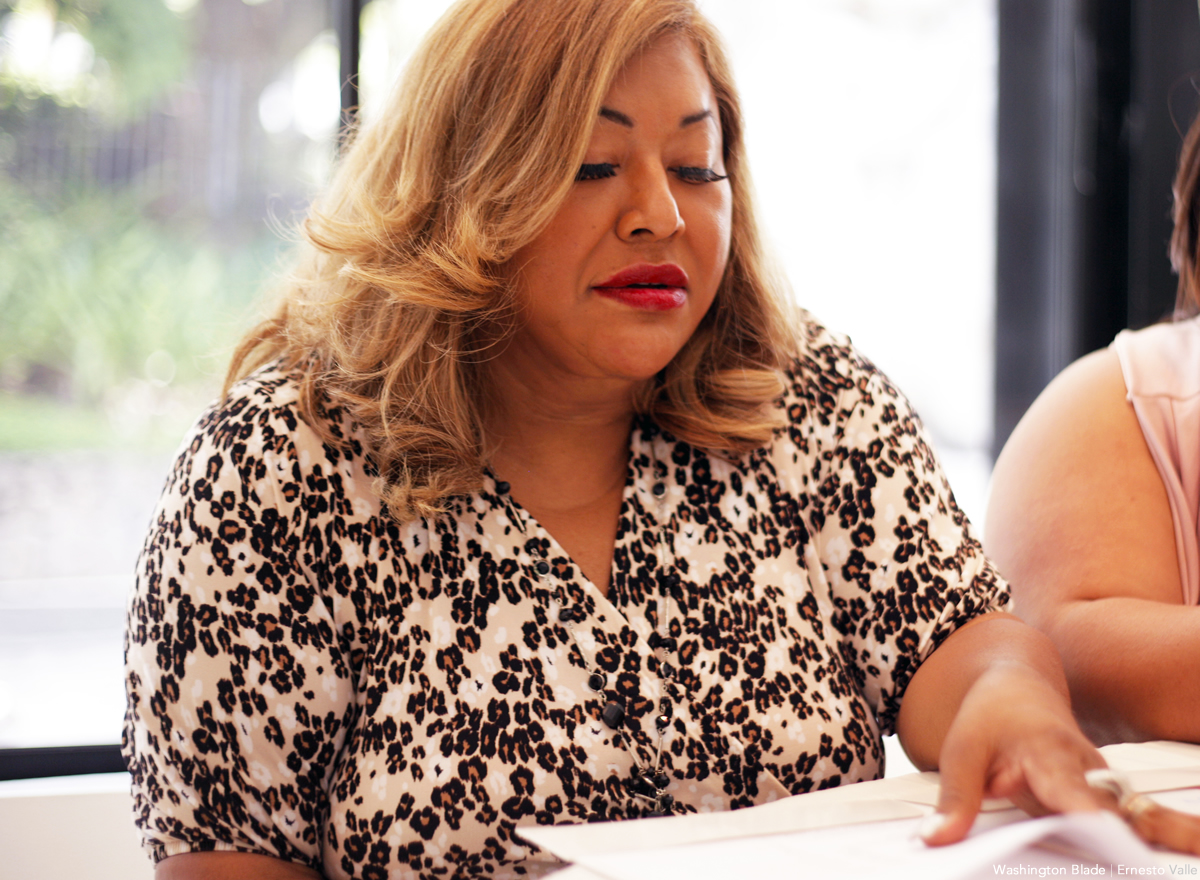
A federal judge on Jan. 13 sentenced Ruby Corado, the founder and former executive director of the now closed D.C. LGBTQ community services organization Casa Ruby, to 33 months of incarceration for a charge of wire fraud to which she pleaded guilty in July 2024.
U.S. District Court Judge Trevor M. McFadden handed down the sentence that had been requested by prosecutors with the Office of the U.S. Attorney for the District of Columbia after Corado’s sentencing had been postponed six times for various reasons.
The judge also sentenced her to 24 months of supervised release upon her completion of incarceration.
In addition to the sentence of incarceration, McFadden agreed to a request by prosecutors to hold Corado responsible for “restitution” and “forfeiture” in the amount of $956,215 that prosecutors have said she illegally misappropriated from federal loans obtained by Casa Ruby.
The charge to which she pleaded guilty is based on allegations that she diverted at least $180,000 “in taxpayer backed emergency COVID relief funds to private offshore bank accounts,” according to court documents.
Court records show FBI agents arrested Corado on March 5, 2024, at a hotel in Laurel, Md., shortly after she returned to the U.S. from El Salvador, where authorities say she moved in 2022. Prosecutors have said in charging documents that she allegedly fled to El Salvador, where she was born, after “financial irregularities at Casa Ruby became public,” and the LGBTQ organization ceased operating.
Shortly after her arrest, another judge agreed to release Corado into the custody of her niece in Rockville, Md., under a home detention order. But at an Oct. 14, 2025, court hearing at which the sentencing was postponed after Corado’s court appointed attorney withdrew from the case, McFadden ordered Corado to be held in jail until the time of her once again rescheduled sentencing.
Her attorney at the time, Elizabeth Mullin, stated in a court motion that her reason for withdrawing from the case was an “irreconcilable breakdown in the attorney-client relationship.”
Corado’s newly retained attorney, Pleasant Brodnax, filed a 25-page defense Memorandum in Aid of Sentencing on Jan. 6, calling for the judge to sentence Corado only to the time she had already served in detention since October.
Among other things, Brodnax’s defense memorandum disputes the claim by prosecutors that Corado improperly diverted as much as $956,215 from federally backed loans to Casa Ruby, saying the total amount Corado diverted was $200,000. Her memo also states that Corado diverted the funds to a bank account in El Salvador for the purpose of opening a Casa Ruby facility there, not to be used for her personally.
“Ms. Corado has accepted responsibility for transferring a portion of the loan disbursements into another account she operated and ultimately transferring a portion of the loan disbursements to an account in El Salvador,” the memo continues.
“Her purpose in transferring funds to El Salvador was to fund Casa Ruby programs in El Salvador,” it says, adding, “Of course, she acknowledges that the terms of the loan agreement did not permit her to transfer the funds to El Salvador for any purpose.”
In his own 16-page sentencing recommendation memo, Assistant U.S. Attorney John Borchert, the lead prosecutor in the case, said Corado’s action amounted at the least to fraud.
“The defendant and Casa Ruby received no less than $1.2 million in taxpayer backed funds during the COVID-19 global health crisis,” he memo states. “But rather than use those funds to support Casa Ruby’s mission as the defendant promised, the defendant further contributed to its demise by unlawfully transferring no less than $180,000 of these federal emergency relief funds into her own private offshore bank accounts,” it says.
“Then, when media reports suggested the defendant would be prosecuted for squandering Casa Ruby’s government funding, she sold her home and fled the country,” the memo states. “Meanwhile, the people who she had promised to pay with taxpayer-backed funds – her employees, landlord, and vendors – were left behind flat broke.”
A spokesperson for the U.S. Attorney’s office and Corado’s attorney didn’t immediately respond to a request from the Washington Blade for comment on the judge’s sentence.
“Ms. Corado accepts full responsibility for her actions in this case,” defense attorney Brodnax says in her sentencing memo. “She acknowledges the false statements made in the loan applications and that she used some of the money outside the United States,” it says.
“However, the money was still utilized for the same purpose and intention as the funds used in the United States, to assist the LGBTQ community,” it states. “Ms. Corado did not use the money to buy lavish goods or fund a lavish lifestyle.”
Brodnax also states in her memo that as a transgender woman, Corado could face abuse and danger in a correctional facility where she may be sent if sentenced to incarceration.
“Ruby Corado committed a crime, she is now paying the price,” said D.C. LGBTQ rights advocate Peter Rosenstein. “While it is sad in many ways, we must remember she hurt the transgender community with what she did, and in many ways they all paid for her crime.”
Virginia
Woman arrested for anti-gay assault at Alexandria supermarket
Victim recorded video of Christmas Day attack

Alexandria police announced on Jan. 12 that a Maryland woman has been arrested for allegedly assaulting a man while shouting anti-gay slurs at him at a Giant supermarket in Alexandria on Christmas Day.
The arrest came after a video of the assault that the victim captured with his phone and on which the woman can be heard shouting anti-gay slurs went viral on social media.
Police identified the woman as Shibritney Colbert, 34, of Landover, Md. Alexandria Police Chief Tarrick McGuire stated at a news conference that police responded to a 911 call placed by the victim and attempted to apprehend the woman, but she drove off in her car before police could apprehend her.
He said following an investigation, Colbert was apprehended and arrested in Prince Goerge’s County, Md., on Jan. 8. He said arrangements were being made for her to be brought to Alexandria where she was expected to face charges of assault and battery, destruction of property, felony eluding, and driving an unregistered vehicle.
The video of the incident shows Colbert pushing a shopping cart she was using in an aisle at the Giant store, located at 3131 Duke St., into the victim and another woman who was trying to help the victim. She can be seen throwing groceries at the victim while shouting anti-gay names. “Boy, get out of here with your gay ass,” was among the words she yelled at him that could be heard on the video.
The victim, who police identified only as a 24-year-old man, could be heard on the video saying he does not know the woman and urging her to “please back up.”
“Based on the victim’s statement, comments exchanged prior to the assault, and the totality of the circumstances, investigators believe the victim was targeted because of his sexual orientation,” police said in a statement.
Tarrick said Colbert’s arrest came at a time when Alexandria police were completing a strengthened hate crime policy calling for detectives to investigate crimes based on hate and for the department to prepare reports on hate crimes twice a year.
“Hate crimes are not just crimes against individuals, they are offenses that threaten the entire community and undermine the fundamental principles of dignity, equality, and safety,” Tarrick said.
Alexandria police didn’t immediately respond to a request from the Washington Blade for a copy of the official police report on the incident.
A link to the video posted on the social media site Reddit in which an unidentified man provides some details of the attack, can be accessed here:
Virginia
Mark Levine running in ‘firehouse’ Democratic primary to succeed Adam Ebbin
Outgoing gay Va. state senator has endorsed Elizabeth Bennett-Parker
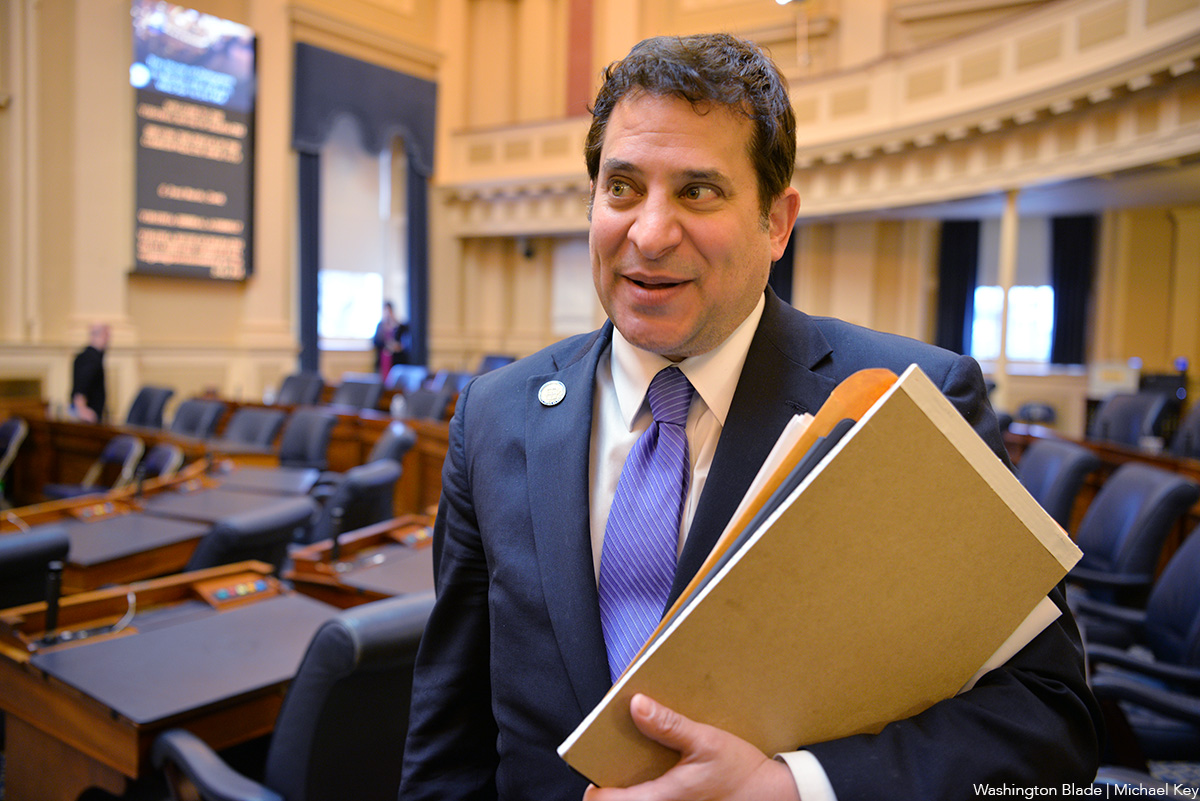
Gay former Virginia House of Delegates member Mark Levine (D-Alexandria) is one of four candidates running in a hastily called “firehouse” Democratic primary to be held Tuesday, Jan. 13, to select a Democratic nominee to replace gay state Sen. Adam Ebbin (D-Alexandria)
Ebbin, whose 39th Senate District includes Alexandria and parts of Arlington and Fairfax Counties, announced on Jan. 7 that he was resigning effective Feb. 18, to take a job in the administration of Gov.-elect Abigail Spanberger.
The Jan. 13 primary called by Democratic Party leaders in Alexandria and Arlington will take place less than a week after Ebbin announced his planned resignation.
According to the Community News of Alexandria publication, a public debate between the four candidates was scheduled to take place one day earlier on Monday, Jan. 12, from 7-9 p.m. at the Charles Houston Recreation Center in Alexandria.
The winner of the so-called firehouse primary will compete in a Feb. 10 special election in which registered voters in the 39th District of all political parties and independents will select Ebbin’s replacement in the state Senate.
The other candidates competing in the primary on Tuesday, in addition to Levine, include state Del. Elizabeth Bennett-Parker, former Alexandria Vice Mayor Amy Jackson, and World Wildlife Fund executive Charles Sumpter.
Another Alexandria news publication, ALXnow, reports that Ebbin, Spanberger, and at least four other prominent Democrats in the Virginia General Assembly have endorsed Bennett-Parker, leading political observers to view her as the leading contender in the race.
“I have worked alongside Elizabeth and have seen her fight for the values of our community,” Ebbin said in a statement, ALXnow reports.
Arlington gay Democratic activist TJ Flavall said Parker-Bennett has attended LGBTQ community events and is known as an LGBTQ ally.
Ebbin’s endorsement of Bennett-Parker over fellow gay politician Levine in the Jan. 13 firehouse primary follows what observers have said is a longstanding rivalry between the two over disagreements around legislative issues.
In 2021, Ebbin endorsed Parker-Bennett when she challenged Levine in the Democratic primary for his House of Delegates seat in the then 45th House District in Alexandria.
Parker-Bennett defeated Levine in that race at a time when Levine, in an unusual move, also ran for the position of lieutenant governor. He also lost that race.
ALXnow reports that in his Facebook announcement of his candidacy for Ebbin’s state Senate seat Levine discounted the relevance of the large number of prominent endorsements that Parker-Bennet has received. In campaigns that last for just a few days rather than weeks or months, “it’s about turnout,” ALX now quoted him as saying.
Levine, an attorney, has a longstanding record as an LGBTQ rights advocate. He worked as a legislative counsel to gay former U.S. Rep. Barney Frank (D-Mass.) before becoming a radio talk show host and TV political commentator in Virginia prior to his election to the Virginia House of Delegates.
The firehouse primary on Jan. 13, which is open only to voters with identification showing they live in the 39th District, will take place from 8:30 a.m. to 7 p.m. in these locations:
Alexandria: Charles E. Beatley, Jr. Public Library, 5005 Duke St.; and the Charles Houston Recreation Center, 901 Wythe St.
Arlington: Aurora Hills Library, 735 18th St. S.
Annandale: New John Calvin Presbyterian Church, 6531 Columbia Pike

